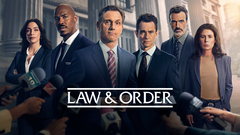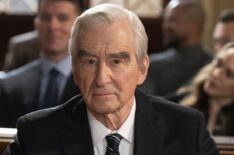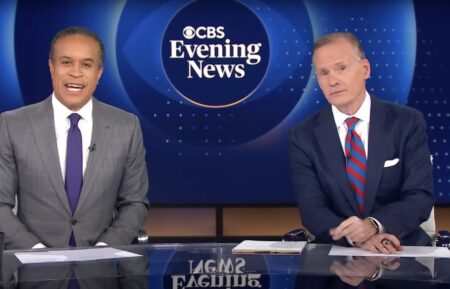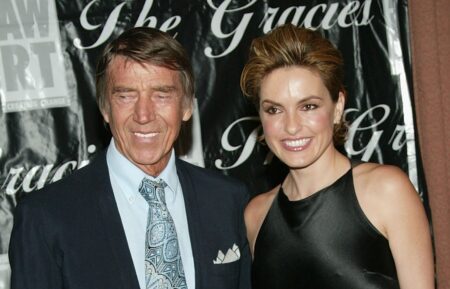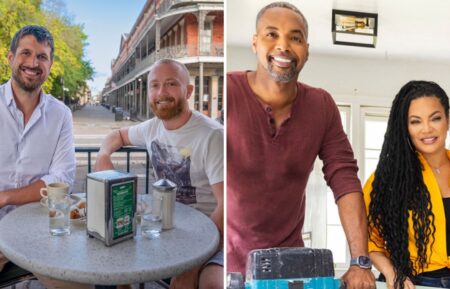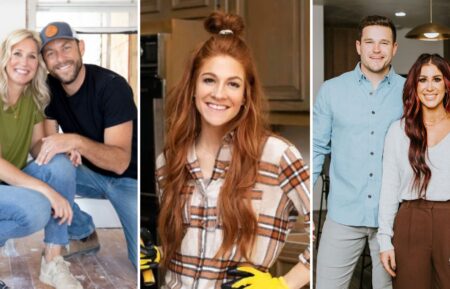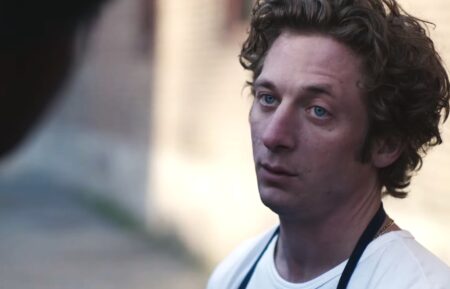‘Law & Order’: Mehcad Brooks Previews Shaw’s ‘Psychological Rollercoaster’ of a Case
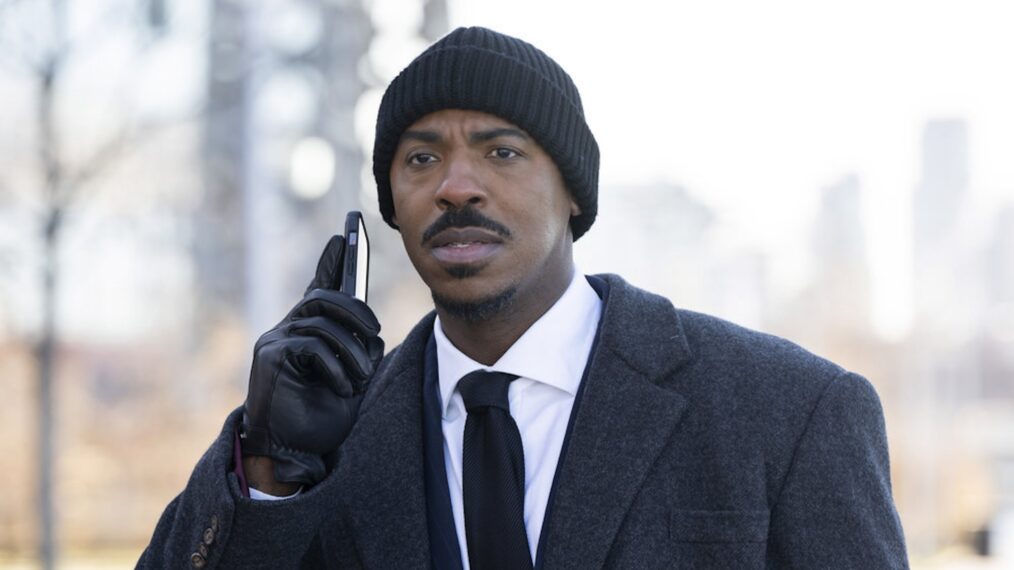
Q&A
Detective Jalen Shaw (Mehcad Brooks) is going to be questioning himself in the February 29 episode of Law & Order—and as a result, we’ll see something we don’t usually see on a procedural drama.
In “On the Ledge,” when the NYPD responds to the scene of an active shooter in a nearby hospital, Shaw is shocked at his connection to the suspect. Then, Maroun (Odelya Halevi) and Price (Hugh Dancy) face a difficult trial when the defendant offers up an insanity plea.
Below, Brooks previews this week’s episode, talks Shaw and Riley’s (Reid Scott) dynamic, and more.
This case has a bit of a surprise for Shaw because he does have a connection to the suspect, but it’s a random one.
Mehcad Brooks: The connection is very random in the fact that Shaw’s on his way to work and he runs into a man who is contemplating suicide. Shaw talks him off the ledge physically and metaphorically and sends him home. Shaw wants to get him some help, but the man claims that he’s fine, he just wants to go home and see his son. When Shaw gets to work, he’s called out to an active shooting at a hospital within minutes, and there’s a doctor that’s been shot, and after talking to the doctor’s wife and following up on a bunch of different leads, Shaw finds out that the active shooter is the man that he helped talk off that ledge that morning. So it’s a psychological rollercoaster for him. He feels somewhat responsible and is making up for it the best that he can but at the same time trying to be diligent with his work. But it’s tearing him up.
So how is he handling the investigation? He has to put his feelings aside because as a detective, he can’t think about all of that.
Yeah, I mean, listen, these guys are not superheroes, they’re heroes. And even if they do 99 percent of the things right, it’s that one percent sometimes that comes back on them. And so Shaw definitely puts his big boy pants on and he does his job, but at the same time, he’s a human being, he’s not a machine. He understands that if he had done something just slightly differently, just made one choice differently, that maybe this doctor would be alive, maybe this single father wouldn’t be on trial for murder or a fugitive at the time. And so this does get to him.
Law & Order has been this beacon of integrity and virtue and morality for decades, and I think that that has to be evolved and updated as our society changes. And I think one thing that we are incorporating is the vulnerability of these detectives and the district attorney’s office. It’s the vulnerability, it’s the sensitivity, it’s the cultural sensitivity. It is the fact that justice means something different for each community. It has to be contextualized in that way. And all these compelling stories that are intersecting with these characters who have different backgrounds—we can tell these stories in very accurate ways because of that. And so what I think you’re going to see is a level of vulnerability, a level of sensitivity that we’re not used to, not just on Law & Order, but on procedural television, period.
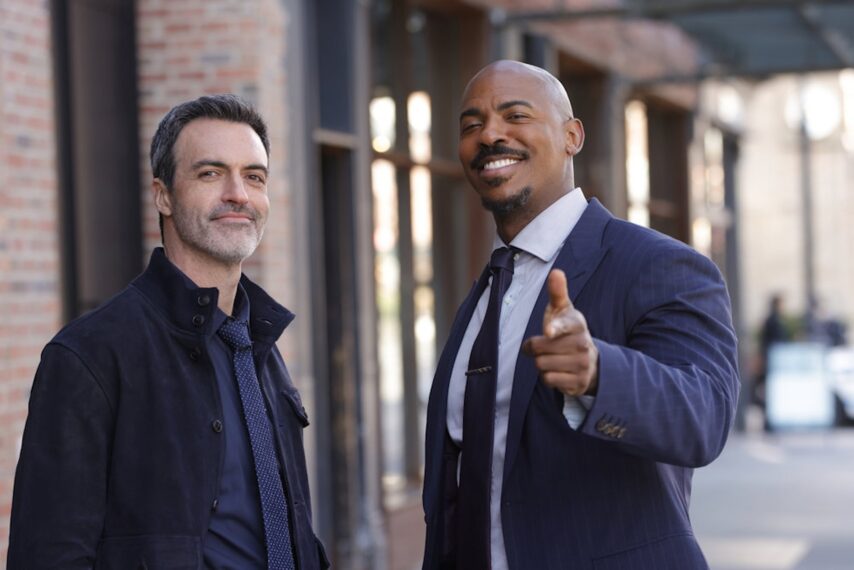
Will Hart/NBC
It hasn’t exactly been smooth sailing for Shaw and Riley, but how’s Shaw feeling about his new partner and their dynamic at this point?
Sometimes it’s hard for me to divorce Mehcad Brooks’ feelings for Reid Scott and Jalen Shaw’s feelings for Vincent Riley because I love Reid. He’s just amazing. I don’t know what kind of crystal ball the Wolf family has, but they have put two guys together who are brothers from another mother. So it’s just a love fest at all times and we’re constantly trying to one up each other and making jokes and trying to make the crew laugh, and that’s just who we are. And so I’m very lucky, very blessed and humbled and honored to be working with somebody who’s got the same sense of humor and the same view of society and forgiveness and all these things that we align on.
When it comes to Shaw and Riley, they’re still figuring each other out, and I think that with any good duo, any good buddy situation that you see on television or film, the key is that those two actors made a conscious choice that the partnership had to be the third character, and we did that. And so I think you’re going to see moments of kindred spirits finishing each other’s sentences and you’re going to see internal conflict that bubbles out. It’s not the same thing as we’ve seen before. This is so different because it’s normally, there’s an older guy, there’s a younger guy, it’s a mentor and protege, the old curmudgeon and the young idealistic cop. But it’s not that. It’s two guys who are about the same age who see the world the same way, but they’re from totally different backgrounds. And I think that contextualizing it in such specific ways is really interesting to play and interesting to watch.
You’re no longer the newest cast member. There are two new cast members this season, Reid and Tony Goldwyn [playing the new district attorney, following Sam Waterston‘s exit].
It feels good to not be the rookie anymore!
How are you feeling about how you’ve settled into the character and the show and how your character’s settled in with this squad? Because it seems like Shaw really just rolls with the punches when it comes to change.
Yeah, I mean, listen, mean, this is America. You got to roll with the punches when it comes to change. I mean, nobody saw 2016 coming. Nobody saw 2020 coming. And so I think our society is good at rolling with the punches. I think that Americans in particular are good with solving crises, but we’re not good in preparation, right? And so I think Shaw as an extension of that—and not that there’s anything that’s been a crisis yet, but I think you’ll see one [tonight], frankly.
I see Shaw as the etymology of his name, which is Jalen Shaw, which is Jalan, which comes from Shalom, peace, and Shaw is Welsh for wolf. And so I see him as this calm wolf and whatever comes, whatever storm is coming for him, he knows how to hunker down and figure out exactly what he’s hunting for. What he’s hunting for is a better world. What he’s hunting for is a safer city. And so I just kind of ground myself in that reality for him. I think that’s what you see, that the fact that he, as you said, rolls with the punches.
Yeah. And I like that he can focus on that.
Right. He’s a very focus driven person. He’s a very purpose driven person, and he keeps his eye on the prize just like a wolf would.
What else is coming up for Shaw this season?
I don’t know. I like to be surprised. I trust the writer’s room implicitly. We have an incredible staff of writers, a lot of talented directors and producers, and we have just an incredible mechanism that drives this show forward and a really unique combination of creativity and business acumen. So you can bet whatever it is, it’s going to be something that America’s already talking about or that we can help initiate the conversation for America to talk about it. So I trust them implicitly. I love getting the scripts and going, okay, what are we doing now?
Is anything with his personal life coming up?
Shaw had a situation happen last season where he was racially profiled.
Such a good episode.
Thank you so much. We don’t have a lot of racial literacy in this country. But what that is, what you saw and what you appreciated about that show, I think, in some ways was you experienced what it felt like to watch someone go through racial trauma, which is the psychological reaction to racial discrimination and also physical reaction to racial discrimination or racism. I think that that is a personal issue for Shaw as well as a professional issue for Shaw, and that comes up for him again in the next episode where he experiences a family that’s dealing with racial trauma. And so he’s got to make some really hard decisions in his own personal life about how can he be culturally sensitive and culturally compassionate to this family that he completely understands, but also do his job? That is a very difficult situation for him.
And I think it is a situation that tens of millions—at the very least tens of millions of Americans—have to deal with on a daily basis, that racial trauma is not something that’s going to go away. It’s not something that, even if the DSM-5 doesn’t recognize it, we can continue to ignore. My ancestors had to ignore it to a certain extent because their survival was predicated on that. But we are in a space now where we’re able to understand that it’s wrong to bully an individual, right? It’s wrong to cyberbully an individual, but when you apply that, it’s wrong to bully a group of people, we somehow lose the thread, right? And I’m not sure why that is. And I think that Law & Order is able to initiate these types of conversations around the dinner table and around our communities, and I’m so blessed and so honored and privileged to be a part of that.
Law & Order, Thursdays, 8/7c, NBC
From TV Guide Magazine
How 'Countdown' Recruited Jensen Ackles to Go Full 'Die Hard'
Countdown boss Derek Haas talks creating the character around Ackles, and the cast teases the “Avengers”-like team of the crime thriller. Read the story now on TV Insider.
